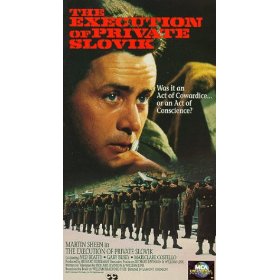 Long before made-for-television movies lost all creativity and became the same recycled plot from “Mother May I Sleep with Danger,” there was the 1974 classic “The Execution of Private Slovik,” an amazing, detailed account of one true-life event that stirs many thought-provoking questions centered on the stunning performance of one of the best actors of our time.
Long before made-for-television movies lost all creativity and became the same recycled plot from “Mother May I Sleep with Danger,” there was the 1974 classic “The Execution of Private Slovik,” an amazing, detailed account of one true-life event that stirs many thought-provoking questions centered on the stunning performance of one of the best actors of our time.
The movie follows Private Eddie Slovik, who was the only man put in front of a firing squad for desertion since the Civil War. It also serves as a character study of this young man, who never got a chance to enjoy his life.
At the start of World War II, Slovik is being released from juvenile hall for petty crimes he committed as a kid, allowing him to be 4F. (That allowed him not to be drafted.) He decides to work his way to the top again by working hard, finding the love of his short life and saving up for a house.
The movie starts out inspiring but the title, history and some early scenes allow you deal with the fate that awaits Slovik. Shortly after he saves up the money to buy a house he and his wife can call their own, the Army changes him from 4F to 1A. Slovik suffered from severe anxiety when it came to handling weapons, and knew that in battle he would ultimately be killed. That knowledge forced him to make the decision to flee, fully aware he would have to serve some jail time but never expected to be executed.
How you feel will determine a large amount of whether or not you sympathize with Slovik. It is bold that a television movie took those chances with material that will easily divide viewers and leave many with so much to talk about. Not only that, but Vietnam was a fresh topic in the minds of Americans and this was, in some ways, a protest film. It is one of the most intelligent and well-made protest pictures of its time, because it approaches the material at many angles, allowing viewers to make their own informed decision, and does not provide spoon-fed emotions or answers.
The stubborn side of Slovik is shown, so make no mistakes: He is not a clear-cut hero, but he is someone that stood up for what he believed in and faced the consequences.
What elevates the picture is an amazing performance from Martin Sheen as Slovik. Sheen is startling in the way he is able to convey the inner turmoil felt by the main character. A particularly poignant scene shows him repeatedly reciting the “Hail Mary†prayer, visibly realizing that death is closer with each repetition until he has tears in his eyes. Anybody with a heart will be, as well.
It is more than words in Sheen’s performance since he seems to truly believe in the material, and that will convince you that he is Slovak. Not many actors could provide the series of emotions that he does throughout in this awe-inspiring moment in television history. We experience the full life of the character, the courtship of his soon to be wife, his new house, the wedding, money troubles, joy and ultimate sadness of what was to come for this poor, conflicted young man.
Sheen is supported by a marvelous supporting cast of Ned Beatty, Gary Busey (prior to losing his sanity) and Mariclare Costello as his wife. They each take their small parts and put all of themselves into them, providing depth and realism for the movie.
More realism is added by the direction of Lamont Johnson (“One on One,” “Somebody Killed Her Husband”) because he made the choice to have it narrated by the actors playing the supporting characters that knew Slovik. (A similar approach is used in Ron Howard’s “Frost/Nixon.”)
The telemovie received several Primetime Emmy Award nominations, but won only one for the editing by Frank Morriss.
Despite any onscreen violence, it is completely palpable when we witness the moments of the execution at the beginning and end, which makes this pretty hard to watch. This is real, grim and something that will stay with you for years to come.
“The Execution of Private Slovik” may force you to look inside of yourself to try and understand your feelings on what happens to young people at times of war. That is the testament this film leaves behind.

frank sinatra had the rights to this story for along time but eventually decided it would hurt his career to play Slovik,but he did give the new owners of the film the rights to use his vocal version of have yourself a merry little christmas as the execution takes place.
one of the reasons Martin Sheen gives such a balanced and believable performance is that he trusted his director-Lamont Johnson.
Mr johnson also directed Martin Sheen to a wonderful performance in My sweet charlie,another brave film at the time.
lamont johnson was a brilliant and sadly under rated director-try and find Fear on trial,that certain summer
and amongst his theatrical films Last american hero with another fine performance from Jeff Bridges.
sadly Lamont johnson died last weekend at 88